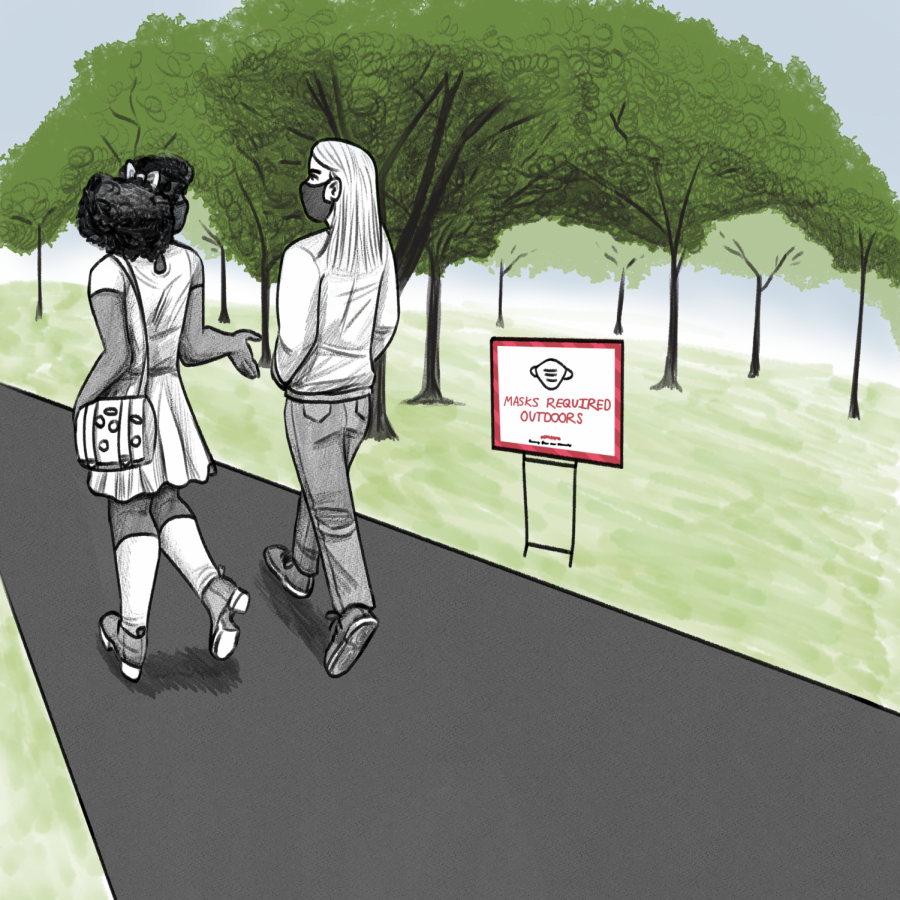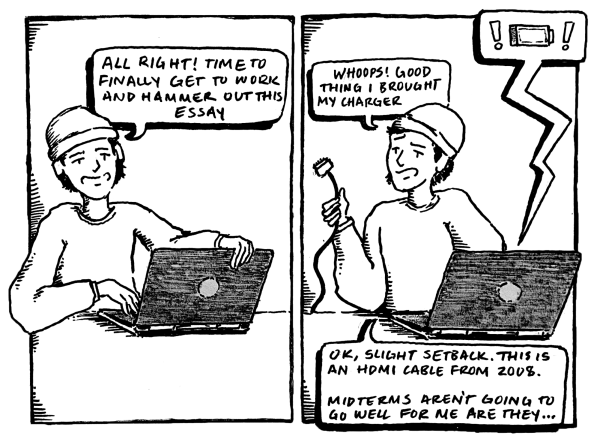Dear Administrators: Drop the Outdoor Mask Mandate
The Centers for Disease Control and Prevention website reads, “In general, you do not need to wear a mask in outdoor settings.” They suggest you should consider wearing a mask outdoors at crowded events, especially if around unvaccinated people. Despite the CDC’s lenient stance, Oberlin has elected to require that everyone mask up in outdoor settings, regardless of vaccination status. While I always support following CDC guidelines and requiring others to do the same, I find myself frustrated by Oberlin’s seemingly sudden commitment to hardcore COVID-19 regulations that, as stated in an email from President Carmen Twillie Ambar on Sept. 27, “go above and beyond” CDC recommendations. Specifically, I am frustrated by the outdoor mask requirement.
Among our 16 peer institutions, there is a wide range of COVID-19 mask policies. The most lenient, at Vassar, allows vaccinated students and employees to be unmasked indoors. On the other end of the spectrum, Reed requires masking for all students indoors and, when distance cannot be maintained, outdoors. Most are somewhere in the middle, requiring masks indoors in public spaces.
Then there is Oberlin. We are the only one of our peer institutions to require masking outdoors at all times. As we head into the 20th month of the COVID-19 pandemic, the burden of wearing masks is more tiresome than ever. Having the opportunity to hang out outside without masks and breathe normally while walking from class to class would do wonders. Instead, students are forced either to wear masks all day long or to head back to their rooms, depriving them of crucial social interaction. As a first-year, I am keenly aware that these first few weeks are some of the most critical for fostering relationships with classmates. The mask mandate means I often find myself having to juggle the importance of engaging with my peers and the consideration of my physical comfort. It is no surprise that this is exhausting and stressful. When I first heard about the new policy, I seriously considered trying to take a gap year.
What makes this mandate even more irritating is that, a few short months ago, Oberlin was an outlier on the opposite end. On May 17, the College announced that it would lift indoor masking requirements for vaccinated students, citing guidance from Ohio Governor Mike DeWine. At the time, given how recently the recommendations had been made, many states, towns, and colleges chose to continue with mask mandates through the end of the school year.
On June 16, Newsweek published a list of every college campus that had announced a vaccine mandate. Every one of our peer colleges was on that list. Oberlin was not. I remember see- ing social media posts from current students demanding that the administration implement a vaccine man- date. I myself spent countless hours complaining to my parents about how annoying and irresponsible the lack of a mandate was. When President Carmen Twillie Ambar finally sent out the news of the long-awaited vaccine mandate almost two months later, there were caveats. The mandate would only be for students — although it has now been extended to faculty and most staff — and it would only happen once the vaccine gained full approval by the Food and Drug Administration.
The Review reported Aug. 13 that, in direct conflict with CDC guidelines, Oberlin would not test vaccinated students who were exposed to the virus unless they displayed symptoms. That same day, ObieSafe sent out an email asking students not to get tested: “Testing out of fear of exposure or as a precaution is not a productive use of your time.” Even now, the College continues to drop the ball on testing, as many campuses have been testing their students weekly.
It appears that the administration received more flack for its apathy toward the threat of COVID-19 than it expected — both in student publications and on social media. Given the drastic shift in our COVID-19 guidelines, our outlier status in requiring outdoor masking, and the lack of data suggesting it is necessary to do so, it is difficult to view the outdoor mask mandate as a genuine effort to keep students safe. Rather, it seems to be a performative attempt at recovery from months of nonchalance as the administration falls over itself to be seen finally taking adequate and concrete action. An outdoor mask mandate is a highly visible and low-cost way to accomplish that.
The drastic swing in COVID-19 protocol has eroded trust in the administration’s decision-making process. While it is understandable that COVID-19 guidelines will change along with circumstances and data, it is concerning that the College’s attitude toward those guidelines has been so inconsistent. The trajectory of Oberlin’s COVID-19 policies demonstrates that the administration will not hesitate to make the decisions that it feels are best for its image rather than its students and employees. If the administration truly wants to do right by our community, it should allow us to spend these precious moments outdoors enjoying the autumn weather — without masks.



